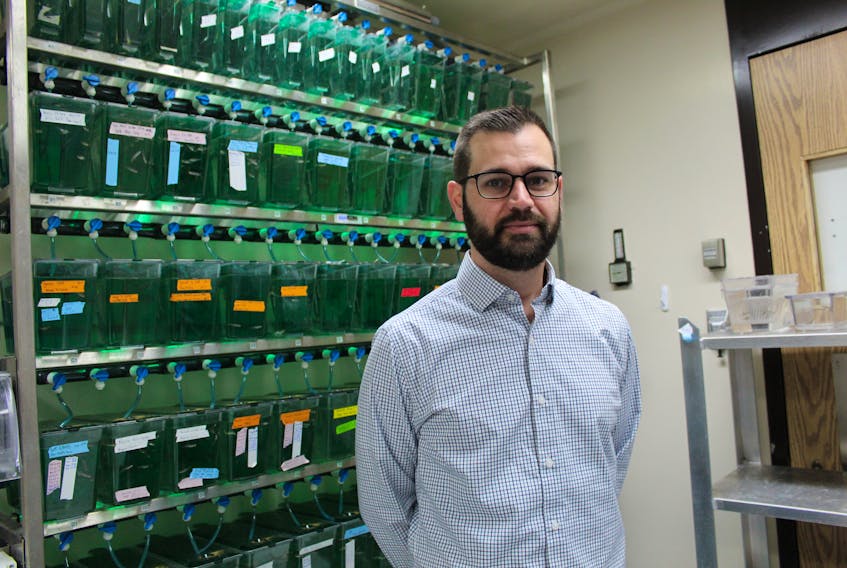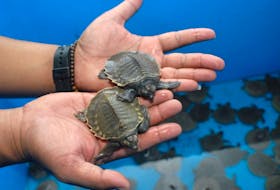Scientists around the world are alarmed after a Chinese scientist announced last month he’d created the world’s first gene-edited babies.
He Jiankui’s claims have shocked scientists in this province, too – and it’s got them talking about what’s ethical — and what’s not — when it comes to genetics research.

He claims to have altered the DNA of twin girls to try to make them resistant to infection with HIV.

“The overwhelming international opinion is that it really was not justified, and that it was irresponsible, actually, to the twin girls that had been edited,” said Memorial University’s chair of genetics, Bridget Fernandez.
Scientist He says the girls’ DNA was edited using a new technology called CRISPR-Cas9, which essentially allows changes to DNA to either add or disable a gene.
It’s recently been used in clinical trials on adults to treat deadly diseases, but only the DNA of certain body cells are edited, and the changes are confined to the person undergoing the editing.
Editing sperm, eggs or embryos is different — the changes can be inherited, and research shows it can have off-target effects — editing one gene can inadvertently affect another.
That’s the kind of editing He used on the twin girls.
That kind of germline editing is illegal in Canada and the United States.
But could it happen here?
There is a researcher at Memorial University’s faculty of medicine whose work involves gene editing.
Curtis French said his research is “fairly similar” to He’s study, but instead of using human embryos, French is using zebrafish embryos.
“We can go into our fish genome and make the same mutation that a human has — to give the fish that type of disease, so we can study it — and then we can try to fix it to see if the disease goes away.”
The difference between his research and what happened in China, said French, is he’s using fish rather than humans, and he’s doing this for research purposes to find treatments for diseases.
“There was really no need to do this editing in these children other than to basically stand up and say, ‘Hey, look, I did it,’” said French.
French said the zebrafish is an excellent model for his research because its genome is 84 per cent the same as the human genome.
But even using a fish model, French said there’s a rigorous ethical approval process. He has to prove it’s unlikely the research will cause undue stress or suffering for the fish.
French said the CRISPR technology still has too many unknowns for it to be used on humans.
“If you create a random change in the DNA somewhere that you’re not expecting, it’s so easy to turn a cell into a cancer cell or something like that by making the changes. That study in China is probably decades ahead of its time — but not in a good way — because we really don’t know exactly what we’re doing with that yet.”
Even with a firm understanding of the technology, French said there are few situations in which it should be used.
“I think in the future — we’re talking decades in the future — if we know that a person is pregnant and that child is going to have some debilitating disease, maybe we could go in and fix that, and that would be a great thing, but that’s years away and that’s with an absolute pressing medical need to do so.”
In terms of whether what happened in China could happen here, Fernandez said there’s a “very, very low risk.”
“I don’t think a project like that could ever be approved, but I guess the fear in the international community is that people would go through routes where they bypass the ethical approval.”
It appears even He went outside the ethical guidelines of his own university when he gene-edited the human embryos because his university, the Southern University of Science and Technology in Shenzhen, is conducting an official investigation.
Ethics of genetic engineering
Memorial University bioethicist and philosopher Jennifer Flynn said this case makes people think about the ethics of genetic engineering in general.

“A lot of ethicists are worried that even if we find genetic engineering for disease prevention morally acceptable, that we will gradually move toward practices in genetic engineering that we find a lot less acceptable, such as, say, engineering for enhancement, like engineering for high intelligence, athleticism, or musicality.”
She said ethicists have raised a variety of concerns about genetic engineering, such as whether genetically altered children would live a free life because they’re designed to be a certain way, whether children would be treated only as instruments of their parents’ satisfaction, and whether parents would feel an overblown sense of responsibility with the ability to choose a child’s genetic makeup.
“Some people also think that this will really undermine our sense of solidarity as a society if some kids are engineered and some aren’t — we will lose our sense that we could all be each other if things were slightly different. …We’ll lose that sense of humility, even. Some of us do well in the genetic lottery and some of us don’t, but according to some thinkers, the proper way of thinking about that is that, you know, ‘I really had no control over the talents I was given’, and the thought is that that’s kind of a healthy attitude.”
Flynn said some ethicists worry that mindset will be undermined by genetic engineering.
However, she said others argue parents do things to enhance children all the time, such as putting them in music lessons at a young age, or reading to babies in utero because it might improve their cognitive development, and that genetic engineering wouldn’t be much different.
Flynn said some thinkers push that point even further.
“I would say this is a minority view for sure, but some others think if genetic enhancement is possible, accessible, practical, and so on, then actually we might even have a responsibility to create children who have the best chance at the best life.”
However, Fernandez said despite the gene-edited babies, scientists are a long way from even having the ability to create so-called “designer babies.”
That’s because scientists currently have a better understanding of genes associated with diseases rather than those associated with normal determined traits.
Twitter: @juanitamercer_









